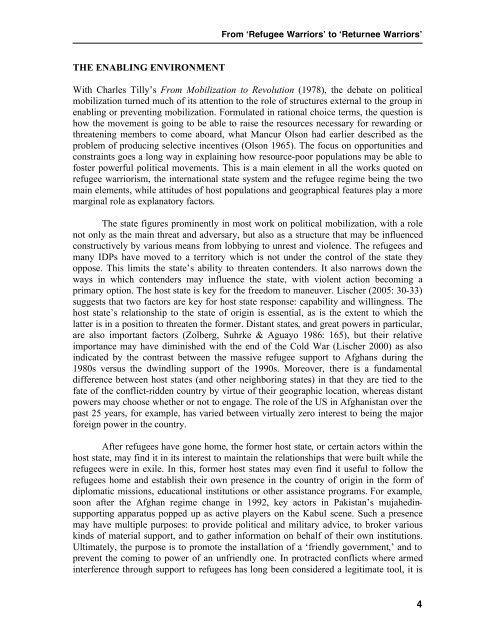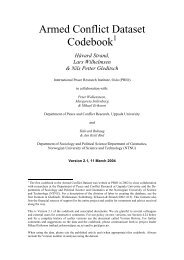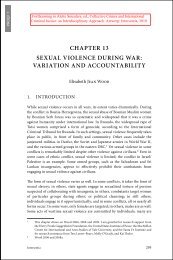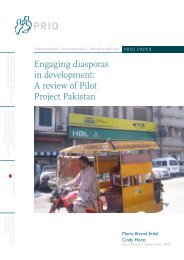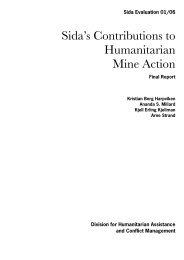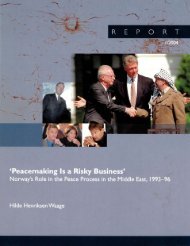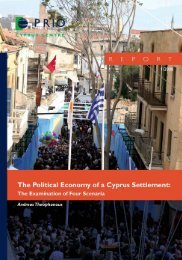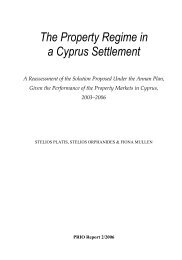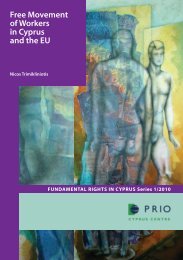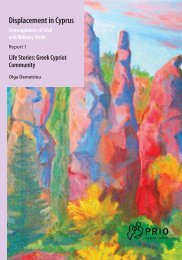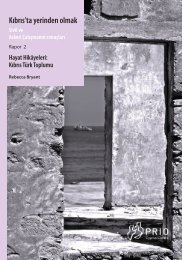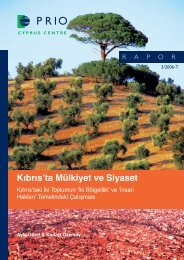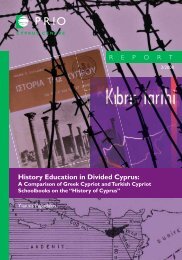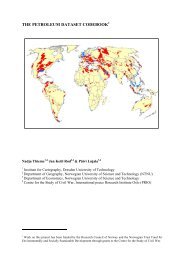Working Paper no. 5 - PRIO
Working Paper no. 5 - PRIO
Working Paper no. 5 - PRIO
You also want an ePaper? Increase the reach of your titles
YUMPU automatically turns print PDFs into web optimized ePapers that Google loves.
From !Refugee Warriors" to !Returnee Warriors"<br />
THE ENABLING ENVIRONMENT<br />
With Charles Tilly’s From Mobilization to Revolution (1978), the debate on political<br />
mobilization turned much of its attention to the role of structures external to the group in<br />
enabling or preventing mobilization. Formulated in rational choice terms, the question is<br />
how the movement is going to be able to raise the resources necessary for rewarding or<br />
threatening members to come aboard, what Mancur Olson had earlier described as the<br />
problem of producing selective incentives (Olson 1965). The focus on opportunities and<br />
constraints goes a long way in explaining how resource-poor populations may be able to<br />
foster powerful political movements. This is a main element in all the works quoted on<br />
refugee warriorism, the international state system and the refugee regime being the two<br />
main elements, while attitudes of host populations and geographical features play a more<br />
marginal role as explanatory factors.<br />
The state figures prominently in most work on political mobilization, with a role<br />
<strong>no</strong>t only as the main threat and adversary, but also as a structure that may be influenced<br />
constructively by various means from lobbying to unrest and violence. The refugees and<br />
many IDPs have moved to a territory which is <strong>no</strong>t under the control of the state they<br />
oppose. This limits the state’s ability to threaten contenders. It also narrows down the<br />
ways in which contenders may influence the state, with violent action becoming a<br />
primary option. The host state is key for the freedom to maneuver. Lischer (2005: 30-33)<br />
suggests that two factors are key for host state response: capability and willingness. The<br />
host state’s relationship to the state of origin is essential, as is the extent to which the<br />
latter is in a position to threaten the former. Distant states, and great powers in particular,<br />
are also important factors (Zolberg, Suhrke & Aguayo 1986: 165), but their relative<br />
importance may have diminished with the end of the Cold War (Lischer 2000) as also<br />
indicated by the contrast between the massive refugee support to Afghans during the<br />
1980s versus the dwindling support of the 1990s. Moreover, there is a fundamental<br />
difference between host states (and other neighboring states) in that they are tied to the<br />
fate of the conflict-ridden country by virtue of their geographic location, whereas distant<br />
powers may choose whether or <strong>no</strong>t to engage. The role of the US in Afghanistan over the<br />
past 25 years, for example, has varied between virtually zero interest to being the major<br />
foreign power in the country.<br />
After refugees have gone home, the former host state, or certain actors within the<br />
host state, may find it in its interest to maintain the relationships that were built while the<br />
refugees were in exile. In this, former host states may even find it useful to follow the<br />
refugees home and establish their own presence in the country of origin in the form of<br />
diplomatic missions, educational institutions or other assistance programs. For example,<br />
soon after the Afghan regime change in 1992, key actors in Pakistan’s mujahedinsupporting<br />
apparatus popped up as active players on the Kabul scene. Such a presence<br />
may have multiple purposes: to provide political and military advice, to broker various<br />
kinds of material support, and to gather information on behalf of their own institutions.<br />
Ultimately, the purpose is to promote the installation of a ‘friendly government,’ and to<br />
prevent the coming to power of an unfriendly one. In protracted conflicts where armed<br />
interference through support to refugees has long been considered a legitimate tool, it is<br />
4


